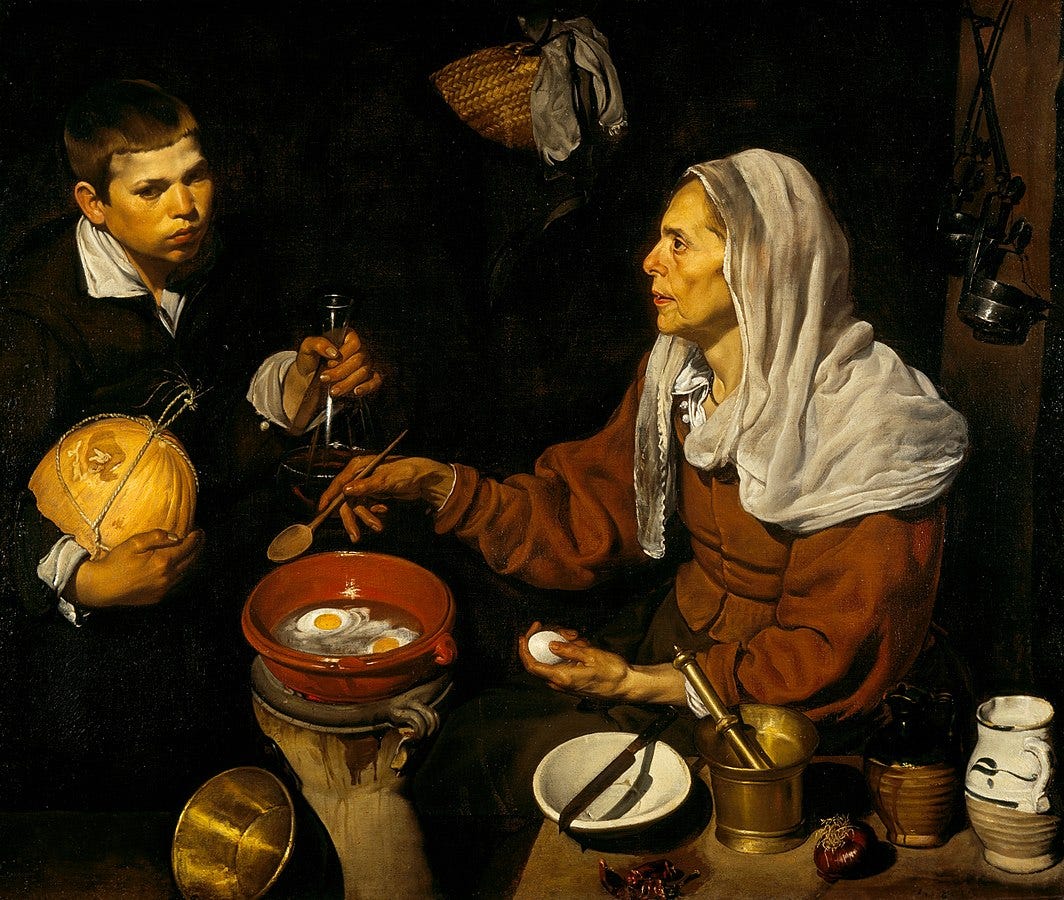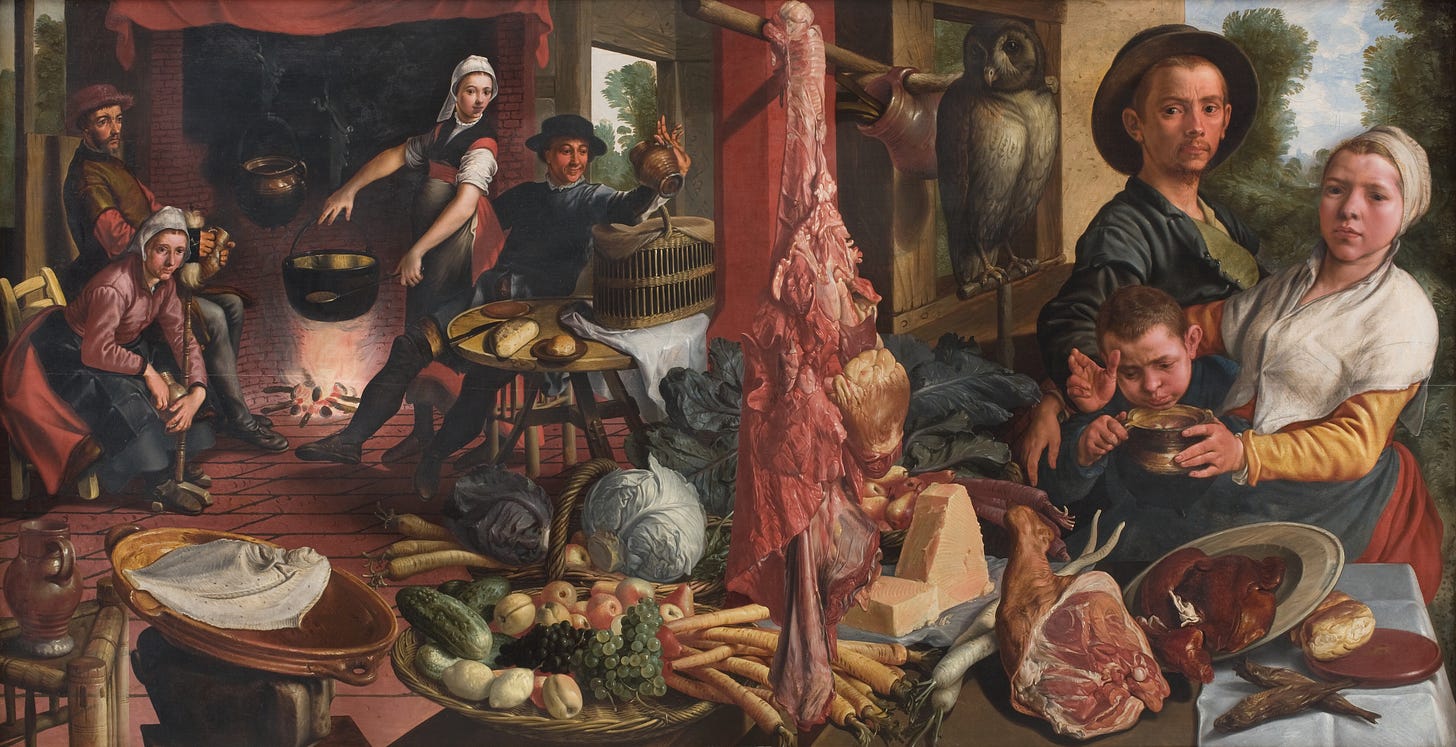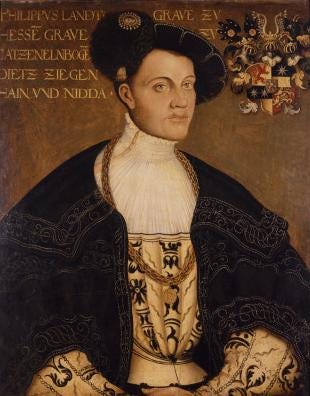On the table week 16
The Prince with two wives
‘I tell you how Münster will end.’
Light and Shadow
‘When you speak to Henry,’ More says,’ I beg you, speak to the good heart. Not the strong will.’ That was four years ago, at a dinner at Bonvisi's house, where Cromwell and More were guests. In the autumn of 1534, More is sitting in the Tower and Cromwell has food sent to him via Antonio Bonvisi. Now Bonvisi appeals to Cromwell's good heart for More.
More wants dishes of eggs and milk puddings. He eats this perhaps less for religious reasons, for moderation, but for me it would be what you would eat if you weren't feeling well, something digestible, nothing heavy, something that calms you down and does you good.
An Old Woman Cooking Eggs by Diego Velazquez, 1618 (I love this painting, my favorite so far)
Otherwise, this week there are apples from Kent, hundreds of stewing pears and Cromwell walks in the footsteps of Uncle Norfolk: “ Mark, if you stand there like a landed fish, I shall have you filleted and fried.” Culinary threats are normally a characteristic of Norfolk. Smeaton should realise that he better make himself invisible when Cromwell turns up.
In an exchange of culinary niceties between Cromwell and Chapuys, Eustache wins hands down - what's a capaun against good olive oil and Parmesan?
A Royal Guest
At the dinner at Bonvisi's house in 1530 , we got something like a recipe from Cromwell (mint sauce) for the first time when he keeps interrupting Bonvisi, who wants to warn him about the Boleyns. Now, before the king's visit1, we get another one: Roasted piglet and for the filling you need: chopped chicken, lardo, goat´s liver, minced feenel seeds, majoram, mint, ginger, butter, sugar, walnuts, hen´s eggs and some saffron2.
Having resigned myself to the fact that Cromwell's early years will forever remain obscure, Mantel reopens this wound this week by having Cromwell say, in reference to the food dish: ‘I saw it done once at a papal diner.’ (!) Yes, and where, in what context, who was there, what did he do there?? Hilary, I need answers!
The Fat Kitchen. An Allegory by Pieter Aertsen, between 1565 and 1575
The Prince with the two wives
When More and Cromwell talk about Münster, More mentions Philip of Hesse. If I remember correctly, Henry once toyed with the idea of two wives, Philip actually carried it out: From 1523 he was married to Christine of Saxony (and also had sons with her) and in 1540 he married Margarethe of the Saale (allegedly with Christine's consent, but it is unclear to what extent she gave this consent of her own free will.) The double marriage was to remain secret, which could not be maintained and caused him severe political damage and isolation.
Philip, Prince of Hesse by Hans Krell, 1534
‘I tell you how Münster will end.’
Cromwell is right when he predicts the defeat of the Anabaptist kingdom of Münster by defectors, because that is exactly what will happen in 1535. The self-proclaimed King Jan van der Leiden, also known as Jan Bockelson, is tortured and executed along with other leaders in January 1536.
And More is right with his prediction that a wool merchant, a blacksmith´s son does not last long at the top. He will only last longer than the one or two years More gives him. But he will fall.
Jan van der Leiden by Heinrich Aldegreve (printer), 1536
17 April, not only did we read this week according to the date, but it's also the date of my birthday - it took more than half a century, but now I've read the date in a book for the first time in my life. I don't want to brag now, haha - but: it was also mentioned by none other than Hilary Mantel!! Big smile when I read it.
We've had Saffron before. Just like the egg dish: When they arrived in the north after Wolsey´s fall from power Cromwell made an egg dish for the devastated Wolsey, asking for Saffron.








Happy belated birthday! Did you have any royal visitors?
Thank you! Lovely pictures and lovely details. I look forward to your contribution every week, and am not disappointed….. And Happy Birthday!